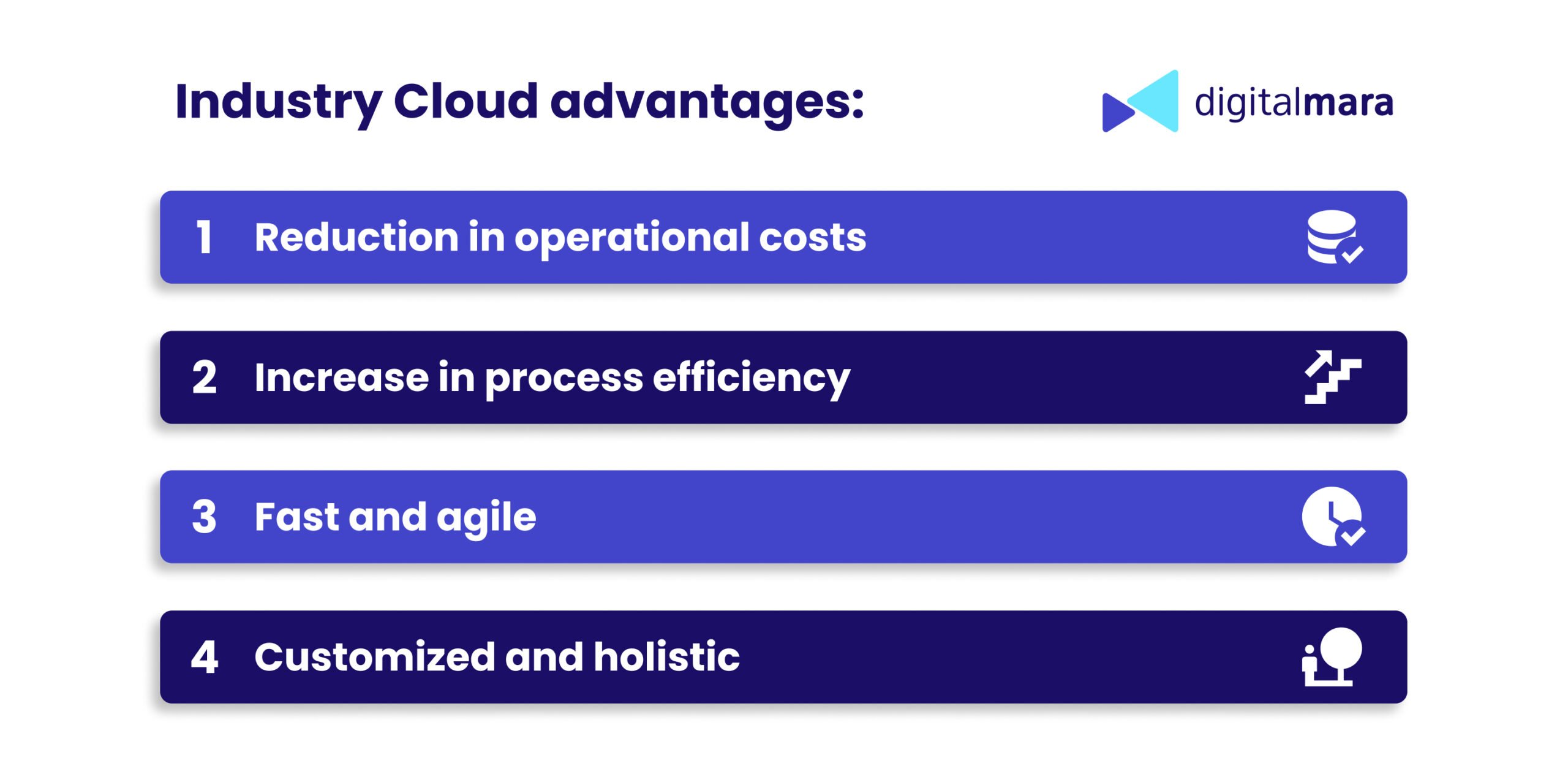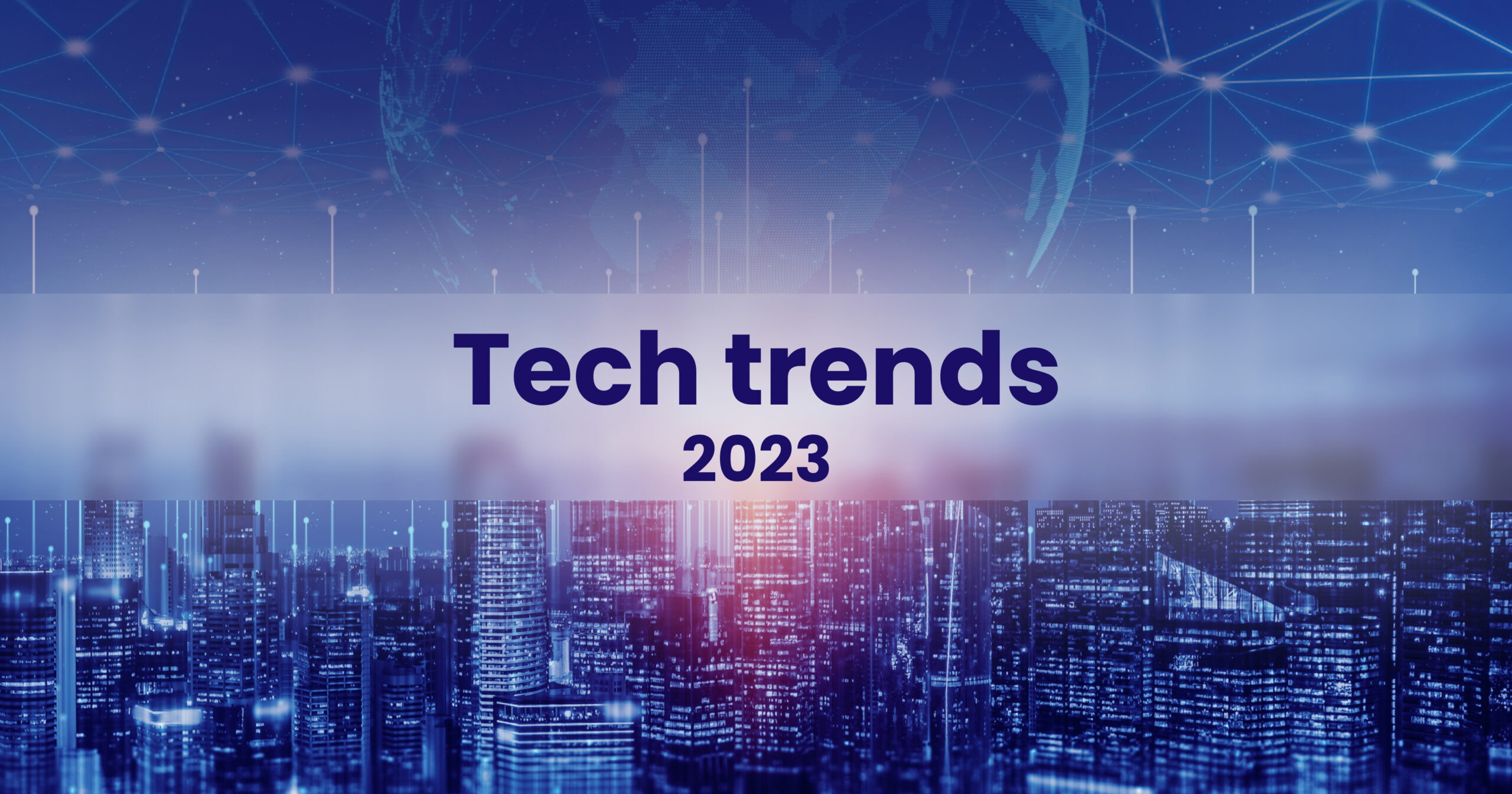In general, maintaining on-premises data storage services is expensive. That’s why organizations ranging across industries such as healthcare, retail, government, finance, and insurance, are transitioning to cloud storage, which allows for greater agility, scalability and faster processes. However, security remains a top concern, as these organizations need to preserve strict control over critical data. Industry cloud platforms can be a viable solution, tailored to the specific needs of each industry. DigitalMara has studied the peculiarities of such platforms and how they work in different industries.
Experts see the potential of industry clouds and are predicting exponential growth. Deloitte estimates the prospective market for these systems as $640 billion. And Gartner says enterprises eventually will use these platforms to conduct more than 50% of their core business operations. Industry-specific clouds make things easier for organizations by using predefined industry scenarios and processes, along with custom pre-built tools, workflows, and data models.
What is an industry cloud platform or industry cloud?
According to Statista, today over 60% of corporate data is stored in the cloud, and companies are striving to use cloud solutions for their data management. Cloud services like Software-as-a-Service (SaaS), Platform-as-a-Service (PaaS) and Infrastructure-as-a-Service (IaaS) allow for managing data workloads and delivering services. Nevertheless, such services are not streamlined for a specific industry.
Industry cloud platforms are designed with customization in mind. They have features of all of the SaaS, PaaS, and IaaS solutions, but tailored to the needs of a particular industry, such as capacity to meet compliance regulations, deal with high loads and process large amounts of data. Enterprises can use existing solutions from Microsoft, AWS, or Deloitte, or potentially co-create a new one with an IT partner.
- Old code issues
Many companies in healthcare, retail, government, finance, and the insurance industry are still relying on on-premises data centers and using legacy systems for their core operations. Migrating to the cloud or replacing the entire system with a cloud solution is an efficient approach to modernization.
The main concern, when it comes to implementing digital solutions, is ensuring cybersecurity and handling sensitive data. Companies want to minimize their risks and preserve their data securely. Added to those concerns is the fact that migrating is time-consuming and costly. Industry clouds have the potential capability of leveling out these risks.
- Privacy and security
Healthcare, retail, government, finance, and insurance are highly regulated industries that should follow strict security and privacy standards. Cloud platforms make it possible to create an environment that complies with all of them. Industry platforms can provide threat detection, security testing, prevention and more.
- Components and services
Industry clouds offer preconfigured blocks and modular technology capabilities to redesign and reengineer processes. This composable approach allows for adapting the digital solution more easily to the enterprise’s needs, making it more agile, scalable and stable. Their advanced functionality allows the system to perform many kinds of tasks, and to work smoothly with heavy loads and large data volumes.
In general, an industry cloud platform consists of 3 components: data fabrics, packaged business capabilities, and composable tooling. In addition to APIs, data models and workflows, they offer AI and ML, IoT, blockchain, AR and VR capabilities. It’s easy to gain access to, transfer and manage all the data, to automate processes, and to manage resources.
By having standardized components that perform operations similar to those carried out by their competitors, enterprises can shift their focus to what makes them stand out from the rest. They can create a better product, offer better service, and create a unique customer experience.

Industry-specific examples
- Healthcare
Healthcare providers are changing their tech stack and processes. Virtual hospitals, telemedicine, preventive and personalized healthcare are emerging trends made possible in part by cloud technologies. For efficient and reliable services, healthcare professionals need powerful collaboration tools to manage medical records, provide medical care possible in digital form (for example, writing prescriptions, monitoring dynamics). Patients also can use tools, for example, to make doctor’s appointments and get their test results. An industry platform offers HIPAA-compliant cloud storage with data encryption and highly restricted user controls. The platform allows improvements in care coordination and quality, and helps distribute the load.
- Finance
The financial industry may be one of those most sensitive and exposed to cyber threats. At the same time, customers want permanent access to their account details and to make easy transactions. Providers have to create robust and secure digital solutions. An industry platform provides an interactive digital environment to upload and share financial documents, gather signatures, collaborate on files, manage customers and provide services (such as loan approval). To protect sensitive data, they use access controls, file encryption, and threat detection.
- Government
Government organizations have to process high volumes of data and deal with heavy document turnover, while fulfilling citizens’ demands for easy service online. An industry cloud platform simplifies case management, provides universal access to data, integrates the work of departments and agencies, and, in general streamlines processes. Most importantly, it can meet all compliance and data security regulations.
- Retail
Retailers have to manage high volumes of data in their everyday activities, aka product specifications, inventory, supply chain assets, workforce distribution and more. They need accurate, real-time insights on all activities and assets. An important part of this is marketing campaigns and communication with customers. And customers want to have an omnichannel retail experience. An industry platform unifies all of these retail activities in one place, collects data from multiple sources, uses analytics, makes all processes transparent and optimizes all of the retailer’s activities.
Conclusion
Many organizations are still sticking with legacy systems and not rushing to implement cloud services, mainly out of concerns about security and cost. But refusing to adopt a cloud platform presents obstacles to realizing the full potential of digitization. Industry cloud platforms allow enterprises to empower their business processes and achieve strategic goals, while maintaining high compliance and data security standards.
DigitalMara can support you on your transition into the cloud. We know how to work with the modern cloud and build a solution tailored to your business needs.



